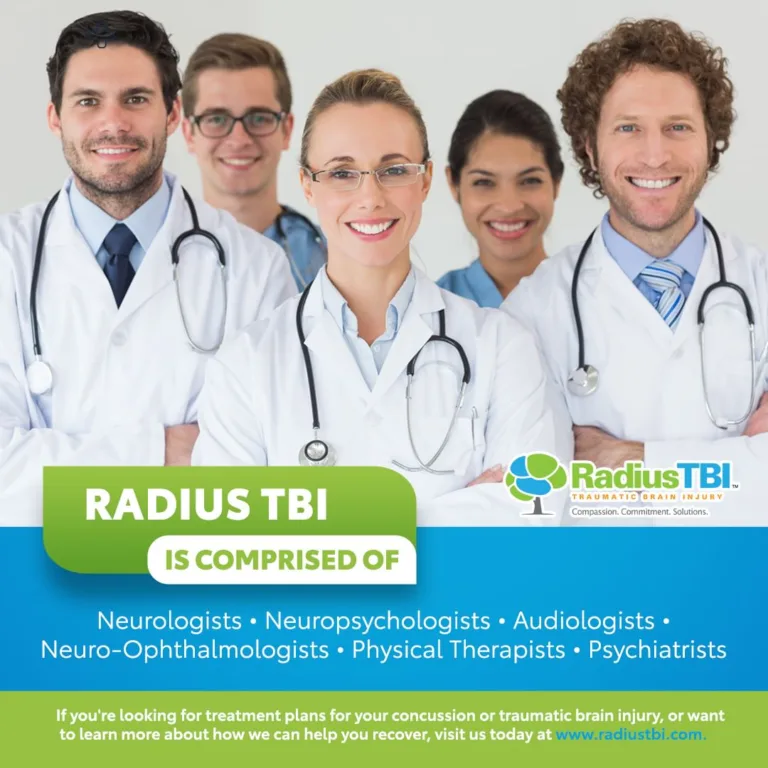Sports Concussion
Integrative Medical Care for Sports Concussion Injury in Ft Lauderdale, Tampa, and Orlando, FL
Understanding
Sports Concussion
Sports-related concussions are a type of head injury that occurs in sports activities. They are defined as a traumatic brain injury induced by a direct or indirect hit to the head or body. A concussion in sports can be caused by contact or non-contact, such as a sudden impact, fall, or collision. Symptoms of sports concussion can be immediate or delayed and may include headache, dizziness, nausea, confusion, and loss of consciousness. Recognizing and treating a concussion in sports as soon as possible is important, as it can have serious consequences if left untreated. Overall, sports-related concussions are an unfortunate reality of many sports, and it’s crucial to take steps to minimize the risk of these types of injuries.
Unfortunately, Sports-related concussions are a common occurrence. Many concussions are not treated, and CDC experts estimate that 1.6 to 3.8 million sports and recreation-related TBIs occur each year in the U.S., according to CDC. Though these injuries can take substantially different forms depending on the sport and individual circumstances, all potentially significantly impact physical and mental health. At Radius TBI, we specialize in diagnosing and treating traumatic brain injury (TBI) incurred through sports activities – allowing us to provide specialized medical care specifically for those affected by sports concussions. In this post, we discuss some of the basics surrounding sports concussions so you can better understand their causes and outcomes.
Causes of sports concussion
Sports-related concussion is a brain injury that can happen in contact sports such as football, soccer, and hockey. It is a result of a direct impact or jarring of the head that causes the brain to move inside the skull. The sudden movement can cause temporary changes to brain function, such as loss of consciousness, confusion, and memory loss. Other causes of sports-related concussions include collisions with other players or objects, falls, and sudden changes in direction. It is important to recognize the signs and symptoms of a concussion to prevent further injury. Proper safety equipment, rule enforcement, and education are crucial in minimizing the risk of sports-related concussions.
Sports-related concussions can be caused by various factors and circumstances. Here are some common causes:
Direct Impact: A sports-related concussion often occurs when an athlete experiences a direct blow to the head from a collision with another player, equipment, or a hard surface. For example, in contact sports like football or soccer, a collision with another player’s head or a fall to the ground can lead to a concussion.
Indirect Impact: Concussions can also happen due to an indirect impact, where a force transmitted through the body causes the brain to move rapidly within the skull. This can occur when an athlete is struck in another part of the body, such as a hard tackle in football or a fall in skateboarding, leading to a whiplash effect and subsequent concussion.
Falls: Falls during sports activities can result in concussions, especially if the head makes direct contact with the ground or other objects. For instance, a slip on the ice in hockey or a fall from a bicycle can cause a concussion.
Equipment-related incidents: In some cases, concussions can occur due to equipment-related incidents. This can happen when an athlete is hit by equipment (e.g., a ball or stick) or when inadequate or faulty equipment fails to provide sufficient protection. Examples include being hit by a baseball, a collision with a hockey stick, or an inadequate helmet in contact sports.
Repetitive Subconcussive Hits: While a single significant impact can cause a concussion, repeated subconcussive hits over time can also contribute to the development of a concussion. This is common in sports like boxing or football, where athletes may experience multiple smaller hits or collisions during a game or practice.
Sport-specific Factors: The risk of concussions can vary depending on the sport. Contact sports, such as football, rugby, hockey, and soccer, have a higher incidence of concussions due to the nature of the gameplay. However, concussions can also occur in non-contact sports, such as gymnastics or cheerleading, where falls or collisions can still pose a risk.
It’s important to note that everyone’s susceptibility to concussions can vary, and the severity of the injury may depend on various factors, including the force of impact, individual physiology, and prior history of concussions. Recognizing the potential causes of sports-related concussions can help raise awareness and promote strategies for prevention and safety in sports activities.
Symptoms associated with sports concussion
Sports-related concussions can manifest through a range of symptoms. These symptoms may appear immediately after the injury or may be delayed, appearing hours or even days later. It’s important to note that each individual may experience different symptoms, and their severity can vary. Here are some common symptoms associated with sports-related concussions:
Headache: Headaches are a common symptom following a concussion. They can range from mild to severe and may persist or fluctuate in intensity.
Dizziness and Balance Problems: Feeling dizzy, lightheaded, or having problems with balance and coordination are common symptoms of a sports concussion. Athletes may experience difficulty maintaining their balance or feel unsteady on their feet.
Nausea and Vomiting: Concussions can cause feelings of nausea or an urge to vomit. This symptom may be accompanied by a general sense of unease in the stomach.
Confusion and Disorientation: Athletes may experience confusion, have difficulty concentrating, or feel disoriented. They may struggle to remember details about the event that caused the concussion or have difficulty recalling recent events.
Sensitivity to Light and Noise: Bright lights and loud noises can worsen symptoms in individuals with a concussion. They may have heightened sensitivity to light or noise, leading to discomfort or headaches.
Fatigue and Sleep Disturbances: Concussions can cause significant fatigue and tiredness, even with minimal physical or mental exertion. Additionally, athletes may experience changes in sleep patterns, such as difficulty falling asleep, staying asleep, or excessive sleepiness.
Mood Changes: Concussions can lead to mood swings, irritability, increased anxiety, or feelings of sadness. Athletes may also experience a lack of motivation or interest in activities they previously enjoyed.
Visual Disturbances: Some individuals with a concussion may experience visual disturbances, such as blurred vision, double vision, or difficulty focusing on objects.
Cognitive Difficulties: Concussions can impact cognitive function, leading to difficulties with memory, attention, concentration, and processing information. Athletes may have trouble following conversations or tasks that require mental effort.
It’s important to note that symptoms can vary from person to person and may change over time. If an athlete exhibits any of these symptoms following a head injury or suspects a concussion, it is crucial to seek medical attention. Proper diagnosis and management are essential to ensure the athlete’s safety and facilitate their recovery process.
Diagnosis and treatment options for sports concussion
As sports continue to be a popular activity for people of all ages, injuries, unfortunately, are a part of the game. One such injury that has received a lot of attention in recent years is sports-related concussions.
Diagnosing and treating this injury properly is crucial, with symptoms ranging from headache to nausea to confusion. Doctors may use a combination of physical exams, imaging tests, and symptom assessments to diagnose a concussion.
Rest is often the best course of action for treatment, along with avoiding activities that could exacerbate symptoms. In some cases, rehabilitation may be necessary to recover fully. Proper diagnosis and treatment for sports concussions are essential for ensuring the long-term health and well-being of athletes of all ages.
It’s important to note that every concussion is unique, and treatment plans should be individualized based on the athlete’s specific symptoms and needs. Close communication and collaboration between the athlete, medical professionals, coaches, and parents are essential throughout the diagnosis and treatment process. The goal is to ensure the athlete’s safe recovery and facilitate a gradual return to sports and normal activities while minimizing the risk of reinjury or long-term complications.
Tips for preventing sports concussion
Sports are an excellent way to stay active and healthy, but it’s important to be mindful of the potential risks involved. One of the most common injuries that athletes face is a concussion. Fortunately, there are ways to help prevent sport-related concussions. To start, proper equipment is essential. Wearing helmets, mouthguards, and other safety gear can greatly reduce the risk of head injuries. Encouraging athletes to practice good sportsmanship and avoiding reckless behavior on the field or court is also important. Finally, coaches and trainers should be knowledgeable about concussions and able to recognize the signs of a possible injury. With these tips in mind, athletes can enjoy their favorite sports while staying safe and healthy.
Treating sports concussion at Radius TBI
A sports-related concussion can be a life-altering injury, especially for athletes who depend on their physical abilities to compete. Treating such an injury requires expert care and attention to detail, which is precisely what you’ll find at Radius TBI. Here, our team is trained in the latest techniques and technologies for concussion treatment, ensuring our patients’ speedy and safe recovery. Our comprehensive approach addresses every aspect of the injury, from the initial diagnosis to the long-term effects on your health and well-being. Trusting your care to Radius TBI means putting yourself in the hands of experienced and compassionate professionals who are dedicated to your full recovery.
Concussion in Sports can cause serious or even fatal injuries and should not be taken lightly. As we have seen, it is imperative to recognize the signs of a concussion and obtain a diagnosis and treatment as soon as possible. The team at Radius TBI has the expertise and experience to diagnose, monitor, and provide treatments for sports-related concussions tailored to each patient’s individual needs. As well as seeing an experienced team, you will also benefit from a multi-disciplinary approach, which means you may see specialists in Neurology, Physical Therapy, Psychology, and Neuropsychology, depending on your individual needs.
If you would like more information on how Radius TBI can help you get back in the game safely after a sport-related concussion, reach out now! In addition to seeking medical treatment when needed for an existing injury, following tips given by medical professionals to prevent sports-related concussions can also help keep you safe both on and off the playing field.
Contact Radius TBI today for more information on diagnosis and treatment options for sports-related concussions. With the right care and attention, athletes of all levels can enjoy their favorite sports while staying safe.
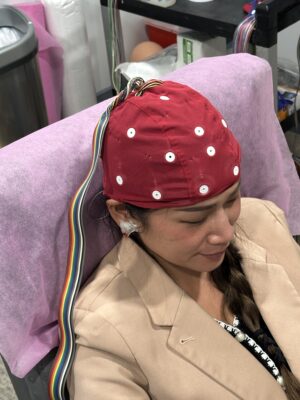
QEEG Brain Map Interpretation
In the world of neuroscience, one of the advanced tools used to understand brain function is the Quantitative Electroencephalogram (QEEG), often referred to as brain mapping. But who interprets these intricate brain maps, and why is their expertise crucial?

Meet Our No.1 Best Neuropsychologist in Tampa, FL Location
At Radius TBI, we pride ourselves on providing exceptional care for individuals suffering from traumatic brain injuries (TBI) and concussions. Our integrated medical team in Tampa, FL, includes some of the most respected and experienced professionals in the field, ensuring
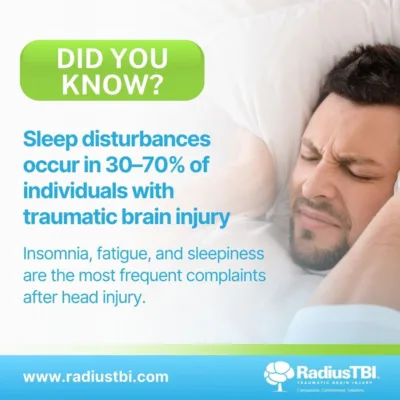
Sleep Disturbance
Did you know? Dealing with a traumatic brain injury (TBI) often means navigating a range of complications, one of the most prevalent being sleep disturbances. Surprisingly, 30-70% of individuals with a TBI experience some form of sleep disruption according to
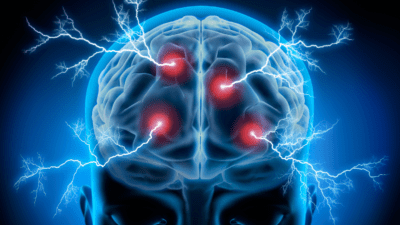
Understanding Routine EEG, QEEG, and Ambulatory EEG Tests
EEG, QEEG, and Ambulatory EEG are distinct forms of electroencephalography, each serving unique purposes in the diagnosis and monitoring of neurological conditions.
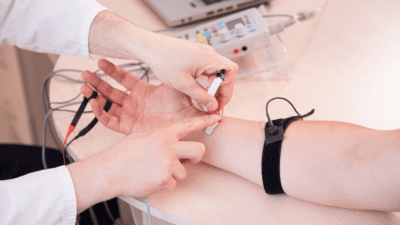
A Deep Dive into Electromyography (EMG Test): Decoding the Language of Muscles and Nerves
Electromyography (EMG) is a diagnostic procedure that plays a crucial role in unraveling the intricacies of the neuromuscular system. By measuring the electrical activity within muscles and the nerves controlling them, EMG provides valuable insights for the diagnosis and management
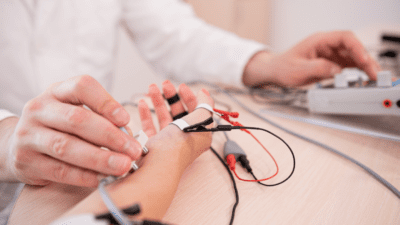
Precise Diagnostics, Proactive Care: Nerve Conduction Velocity NCV Testing Solutions in Florida
The Nerve Conduction Velocity (NCV) test is a diagnostic procedure designed to assess the speed at which electrical impulses travel along nerves. This test is an integral component of neurophysiological studies, providing crucial insights into the functioning of the peripheral

Your Comprehensive Guide to Seeking the Right Car Accident Injury Doctors in Florida
Car accidents can be life-altering events, leaving victims with not only physical injuries but also emotional trauma. It’s crucial to take the right steps after a car accident, especially if you suspect internal brain injury or concussion. In Florida, where




